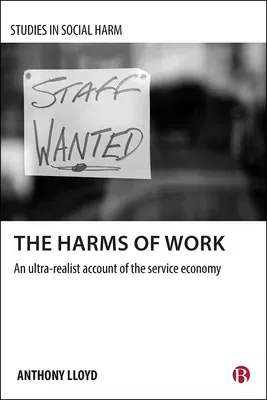Anthony Lloyd
(Author)The Harms of Work: An Ultra-Realist Account of the Service EconomyPaperback, 9 November 2019

Qty
1
Turbo
Ships in 2 - 3 days
In Stock
Free Delivery
Cash on Delivery
15 Days
Free Returns
Secure Checkout

Part of Series
Studies in Social Harm
Print Length
200 pages
Language
English
Publisher
Bristol University Press
Date Published
9 Nov 2019
ISBN-10
1529204038
ISBN-13
9781529204032
Description
Product Details
Author:
Book Format:
Paperback
Country of Origin:
GB
Date Published:
9 November 2019
Dimensions:
23.62 x
16.26 x
2.29 cm
ISBN-10:
1529204038
ISBN-13:
9781529204032
Language:
English
Pages:
200
Publisher:
Series:
Weight:
476.27 gm